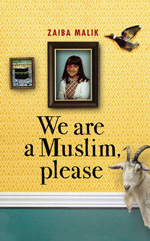

Cornerstone, paperback, 9780434018475
This captivating and enlightening memoir of a Muslim girl growing up in 1970s and 1980s Britain begins in the future, as the author has been captured and taken to the Torture Room of the police headquarters in the Bangladeshi capital of Dhaka. Malik was employed by Channel 4 in Britain, and visited Bangladesh to film a story about the growing influence of Islam there in the months after the 9/11 attacks. Her interrogator tells her that she faces life imprisonment due to her activity against the government and against her religion. In response to her protests, he deeply wounds her with the statement, "No, you are not a true Muslim."
Upon her eventual release, Malik reflects on her childhood, what it meant at that time to be a Muslim in Britain and the larger world, and how this concept has changed since then. She was born in Leeds to Pakistani immigrants who were part of the massive influx of South Asians to the United Kingdom to seek better opportunities. The family settled in Bradford, a working class town so transformed by tens of thousands of Muslims that it was given the nickname 'Bradistan'. Her father was revered in the community, as he was deeply religious and could write and speak English fluently, unlike many of his fellow Muslims. Umejee, her mother, came over from Pakistan after her future husband established himself in Bradford, and spoke few phrases of the language of her new country, which included the term that she would use to identify herself and her family to indifferent white Britons: "We are a Muslim, please."
Malik's early childhood years were influenced by the apnay lokhi, the community of Muslims that she and her family belonged to, particularly the Aunties that made certain that all families followed the rules of proper behavior decreed in the Koran and practiced back home. She existed solely within this community at home and at school in her early years, and her greatest desires were to be a good Muslim and please her father. However, her transfer from middle school to grammar school was a traumatic one, as she was the only Muslim in her class and was shunned and ridiculed by her white classmates, despite her efforts to fit in and reconcile her two lives that were at odds with each other.
At the same time, tensions between the Muslim community and white Britons in and outside of Bradford led to an increase in Asian political activity, which reached a critical point in 1989 after the release of Salman Rushdie's novel The Satanic Verses. In response to the British government's decision to allow the book to be published without censorship, and to the call for a fatwa by Ayatollah Khomeini, the spiritual leader of Iran, a seismic shift took place: young British Muslims became more radicalized, and in turn were portrayed as fundamentalists, terrorists and extremists in the local and national media. Malik, torn between her duties as a Muslim and her desire to blend into her home country and be accepted as a person, made the decision to attend university in a nearby town and enter a secular world separate from her family and community. Her life as a nonpracticing Muslim and journalist was easier to bear, until her arrest in Bangladesh that forced her to reevaluate herself and led to this memoir.
At the end of each chapter Malik conducts an imaginary interview and interrogation of a Muslim man and fellow Bradistani younger than her, who has committed a violent act that has led to the loss of numerous innocent lives. She questions his motives in the context of her own narrative in order to understand why he committed this act, and why he considers himself to be a true Muslim and martyr as a result.
We Are a Muslim, Please is a superb account of the life of a girl and woman who exists between two cultures often
at odds with each other, neither of which she can fully embrace, and how her distant and recent experiences allowed
her to create her own path of success and renew her faith in her religion. Filled with invaluable insight into the
Muslim community and the history of British Muslims over the past 30 years, it is both illuminating and most
entertaining, and deserves to be widely read.
